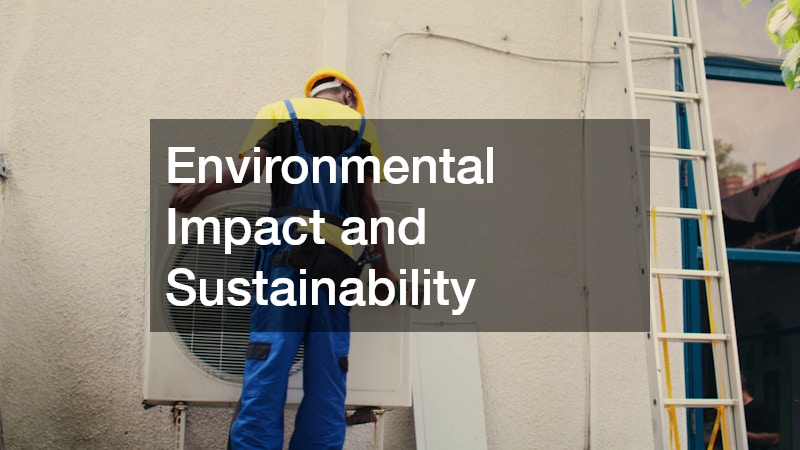
How Air Conditioner Replacement can Lower Your Energy Bills
Reducing energy bills is a priority for many homeowners. One significant way to achieve this is by replacing your old air conditioner with a more efficient model. This article explores how air conditioner replacement can lead to substantial savings and what factors to consider during replacement.
The Benefits of Replacing Your Air Conditioner
Energy Efficient Models
Modern air conditioners are designed to be more energy-efficient, utilizing advanced technology to cool your home effectively while using less energy. Energy-efficient models often come with intelligent systems that adjust their operations based on environmental changes, offering reduced electricity consumption.
This advancement in energy efficiency not only leads to reduced utility bills but also contributes to a decreased environmental impact.
Older air conditioning systems typically have lower efficiency levels, resulting in higher electricity bills. By upgrading to a new model, homeowners can expect to experience significant financial savings over time. Energy-efficient models can reduce energy consumption by up to 20-50%, offering a substantial decrease in monthly energy expenses.
Energy-efficient air conditioners utilize eco-friendly refrigerants that are less harmful to the environment. This means that replacing your AC unit can contribute to decreased emissions of greenhouse gases. Moreover, choosing an energy-efficient model supports global efforts to combat climate change and to adhere to the new air quality standards set to preserve our environment.
Cost Savings Over Time
Although the initial investment in a new air conditioner can seem high, the cost savings on energy bills over its lifespan can offset this expense. Homeowners can potentially save hundreds of dollars per year on their energy costs, which adds up to substantial savings over the lifetime of the appliance. These savings not only recoup the initial outlay but also provide a significant return on investment.
Many new models also come with rebates and incentives that further reduce the upfront cost. By checking local utility provider programs, tax credits, and manufacturer rebates, consumers can minimize initial expenditure. Such incentives are designed to encourage the adoption of energy-saving technologies, making the financial aspect of replacement more appealing.
Determining the Right Air Conditioner Size for Your Home
Assessing Your Home’s Cooling Requirements
Understanding the size of your home and its specific cooling needs is essential to choosing the right air conditioner size and maximizing efficiency. The common mistake of choosing an undersized unit can lead to inadequate cooling and increased energy consumption, while an oversized unit may result in short cycling and wasted energy. Properly sizing the unit ensures optimal performance, leading to improved comfort and reduced energy bills.
Factors such as the number of rooms, ceiling height, window size, and insulation quality play vital roles in calculating the appropriate air conditioner size. Energy efficiency improvements often tie back to how well the air conditioning system matches the home’s cooling needs. Detailed measurements and calculations are necessary to select an air conditioning unit that offers the best energy-efficient solution.
The Importance of Professional Assessment
Engaging a professional to conduct a thorough assessment ensures that you get the most suitable air conditioning unit for optimal performance and energy savings. Professionals can analyze intricate details that generic calculators might overlook, such as the orientation of the house, local climate conditions, and specific occupancy patterns. This precise evaluation paves the way for tailored recommendations that align with your energy efficiency goals.
A professional assessment includes testing the current system for leaks, checking for ductwork discrepancies, and evaluating overall airflow dynamics. These insights help identify potential inefficiencies that, if addressed, can lead to substantial savings. Moreover, professionals can offer guidance on modern features like programmable thermostats that further enhance energy efficiency and savings.
Factors to Consider When Replacing an Air Conditioner
SEER Ratings and Efficiency
The Seasonal Energy Efficiency Ratio (SEER) rating of an air conditioner indicates its efficiency level, with higher ratings representing greater energy savings. It measures the cooling output during a typical cooling season divided by the total electric energy input. Units with higher SEER ratings are more expensive upfront but offer significant energy savings and decreased utility costs over their lifespan.
When replacing an air conditioner, selecting a model with an appropriate SEER rating is crucial. Although minimum legal standards vary by region, aiming for a SEER rating of 16 or higher is often recommended for maximum energy efficiency. These models reduce both your carbon footprint and energy bills, making them a sustainable and financially prudent investment.
Environmental Impact and Sustainability
Replacements can also focus on environmentally friendly options, reducing your carbon footprint while ensuring a more sustainable choice for your home. Modern air conditioners use refrigerants that are less harmful to the ozone layer, aligning with environmental regulations and global sustainability goals. Selecting a unit designed with sustainability in mind enhances your home’s eco-friendly profile and contributes positively to broader ecological efforts.
Investing in energy-efficient appliances, such as air conditioners with high SEER ratings, is not only about personal cost savings but also about making a positive environmental impact. With increasing awareness of climate change, manufacturers have made strides to reduce emissions, improve energy efficiency, and create products that support a cleaner planet. These shifts make sustainable model choices more accessible and financially viable.
Replacing your air conditioner is a significant step towards reducing your energy bills and improving the overall efficiency of your home. By understanding the benefits, evaluating appropriate models, and considering crucial factors during the replacement process, you can make an informed decision leading to long-term savings and environmental benefits. Making conscientious choices about air conditioning replacement empowers homeowners to enjoy comfort, sustainability, and economic efficiency, all while contributing to a healthier planet.
